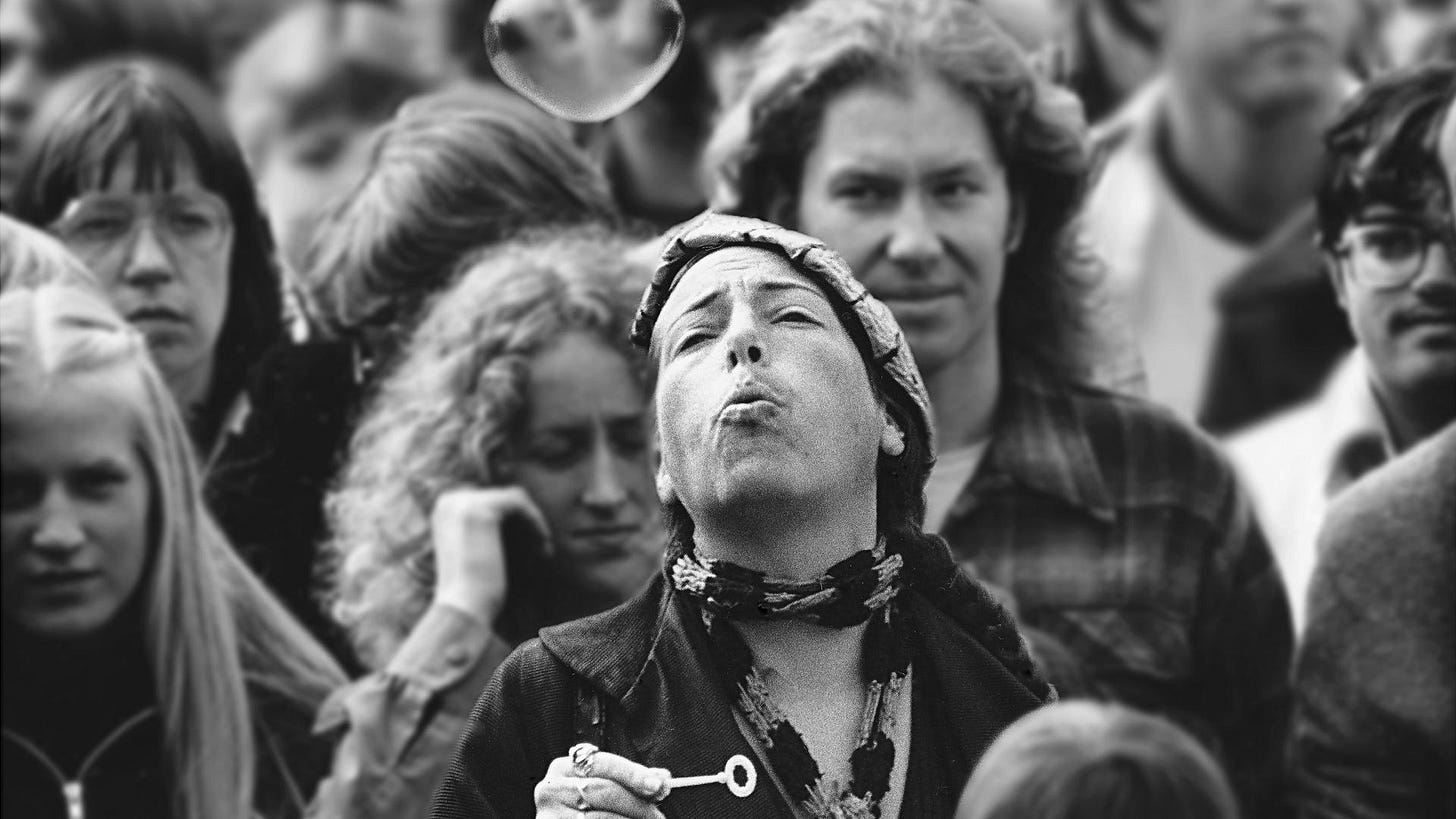Speech bubbles: Peace poet's film tribute
As protests erupted in Berkeley, California in the late 1960s, a writer used a very different weapon to spread her positive messages. Now a documentary of her life beckons
WHEN THE great Patti Smith encountered the work of a relatively unknown Californian poet back in 2021, she was sufficiently inspired to read and record a version of ‘In the Bookstore’ for her own blog website. Smith came across Julia Vinograd through a newsletter with a focus on less familiar, less recognised writers and wrote on February 28th of that year:
‘Today I received my inbox a missive from Poetic Outlaws, which I subscribe to. Everyday there is a poem or a piece of writing from those I admire or those undiscovered. I didn't know today's poet Julia Vinograd but I liked her poem. I'm going to read it aloud and hope it will inspire you to seek work out. Much gratitude to Poetic Outlaws for introducing an energetic work by a worthy poet.’
Smith added: ‘Today is Brian Jones’ birthday, a kind of poetic outlaw. There was supposed to be quite a snowstorm in New York, but it petered out. A little ice residue, nothing more. The poet Julia Vinograd liked to drink coffee and write poetry at the Caffe Medd on Telegraph Avenue. She died in 2018 at the age of 75, forever blowing bubbles.’
The bubbles to which Smith alluded linked to a performance gesture she launched as demos against state governor Ronald Reagan’s planned militarisation of People’s Park, Berkeley, in 1969, were organised and violence against property and clashes with the police were threatened.
Instead, Vinograd blew soap bubbles to resist these proposals. A police officer even asked if he could join in. This passive protest, then used in the wider Vietnam resistance that followed, became her signature act of gentle subversion.
Now acclaimed documentarian and educator Ken Paul Rosenthal is making a biographical film in tribute to Julia Vinograd. Subtitled Between Spirit and Stone, it is a fine tribute and a touching memoir, both artistic and tender, currently in the editing stages.
Rosenthal has been gathering both striking images and rich interview material on this local legend of a street poet. One voice he regrets will not be actively present in the production is one-time Bay Area stalwart and Beat activist David Meltzer, who passed in 2016. He wrote the introduction to Vinograd’s key collection The Book of Jerusalem, first issued in 1984.
Pictured above: Blowing bubbles, Julia Vinograd’s protest gesture
Rosenthal stresses that he is seeking finance to complete his documentary. He comments: ‘Any support to help complete the first cut of the film would be greatly appreciated.’ Readers interested in discovering more about the project can find an interview with the director at the website Sticks and Stones.
The filmmaker adds: ‘While the Beats were a bit before Julia's time, she certainly writes in their lineage of “burn, burn, burn” dedication to her craft and more specifically in Ginsberg's and Blake's legacy of prophetic poetry. Julia wrote a poem about Ginsberg which I've attached. While perhaps more diaristic than poetic, I thought your readers might find it of interest.’ We publish that very piece below…
'Ginsberg'
By Julia Vinograd
No blame. Anyone who wrote 'Howl' and 'Kaddish'
earned the right to make any possible mistake
for the rest of his life.
I just wish I hadn’t made this mistake with him.
It was during the Vietnam war
and he was giving a great protest reading
in Washington Park
and nobody wanted to leave.
So Ginsberg got the idea, 'I’m going to shout
"the war is over" as loud as I can,' he said
'and all of you run over the city
in different directions
yelling the war is over, shout it in offices,
shops, everywhere and when enough people
believe the war is over
why, not even the politicians
will be able to keep it going.'
I thought it was a great idea at the time,
a truly poetic idea.
So when Ginsberg yelled I ran down the street
and leaned in the doorway
of the sort of respectable down on its luck cafeteria
where librarians and minor clerks have lunch
and I yelled 'the war is over.'
And a little old lady looked up
from her cottage cheese and fruit salad.
She was so ordinary she would have been invisible
except for the terrible light
filling her face as she whispered
'My son. My son is coming home.'
I got myself out of there and was sick in some bushes.
That was the first time I believed there was a war.




